key TOYOTA SEQUOIA 2013 2.G Owners Manual
[x] Cancel search | Manufacturer: TOYOTA, Model Year: 2013, Model line: SEQUOIA, Model: TOYOTA SEQUOIA 2013 2.GPages: 740, PDF Size: 15.34 MB
Page 2 of 740

TABLE OF CONTENTSIndex
2
1-1. Key informationKeys ..................................... 32
1-2. Opening, closing and locking the doors
Wireless remote control ....... 33
Side doors ............................ 37
Back door ............................. 42
1-3. Adjustable components (seats, mirrors, steering
wheel)
Front seats ........................... 50
Rear seats ............................ 54
Driving position memory (driver’s seat) ..................... 65
Head restraints ..................... 68
Seat belts ............................. 72
Steering wheel (manually adjustable type) .................. 82
Steering wheel (power-adjustable type)...... 83
Anti-glare inside rear view mirror .................................. 84
Outside rear view mirrors ..... 87
Roof luggage carrier............. 91
1-4. Opening and closing the windows and
moon roof
Power windows .................... 93
Power back window ............. 96
Moon roof ............................. 99 1-5. Refueling
Opening the fuel tank cap... 102
1-6. Theft deterrent system Engine immobilizer system .............................. 107
Alarm .................................. 109
1-7. Safety information Correct driving posture ....... 112
SRS airbags ....................... 114
Front passenger occupant classification system ......... 127
Child restraint systems ....... 132
Installing child restraints ..... 136
2-1. Driving procedures Driving the vehicle .............. 150
Engine (ignition) switch....... 159
Automatic transmission ...... 162
Turn signal lever ................. 166
Parking brake ..................... 167
Horn .................................... 168
2-2. Instrument cluster Gauges and meters ............ 169
Indicators and warning lights ................................. 174
Multi-information display ..... 179
Accessory meter ................. 185
1Before driving
2When driving
Page 6 of 740

TABLE OF CONTENTSIndex
6
5-1. Essential informationEmergency flashers ........... 624
If your vehicle needs to be towed ...................... 625
If you think something is wrong ............................... 631
Fuel pump shut off system .............................. 632
5-2. Steps to take in an emergency If a warning light turns on or a warning buzzer
sounds... .......................... 633
If a warning message is displayed (vehicles with
multi-information
display) ............................. 644
If you have a flat tire ........... 650
If the engine will not start ... 661
If the shift lever cannot be shifted from P ................... 663
If you lose your keys .......... 664
If the vehicle battery is discharged ....................... 665
If your vehicle overheats .... 668
If the vehicle becomes stuck................................. 671
If your vehicle has to be stopped
in an emergency .............. 672 6-1. Specifications
Maintenance data (fuel, oil level, etc.) ........... 676
Fuel information .................. 687
Tire information................... 692
6-2. Customization Customizable features ........ 703
Items to initialize ................. 707
Reporting safety defects for U.S. owners ................. 710
Seat belt instructions for Canadian owners
(in French) ........................ 711
SRS airbag instructions for Canadian owners
(in French) ........................ 714
Abbreviation list ........................ 726
Alphabetical index .................... 728
What to do if... .......................... 737
5When trouble arises6Vehicle specifications
7For owners
Index
Page 29 of 740

29
CAUTION
■General precautions while driving
Driving under the influence: Never drive your vehicle when under the influ-
ence of alcohol or drugs that have impaired your ability to operate your vehi-
cle. Alcohol and certain drugs delay reaction time, impair judgment and
reduce coordination, which could lead to an accident that could result in
death or serious injury.
Defensive driving: Always drive defensively. Anticipate mistakes that other
drivers or pedestrians might make and be ready to avoid accidents.
Driver distraction: Always give your full attention to driving. Anything that dis-
tracts the driver, such as adjusting controls, talking on a cellular phone or
reading can result in a collision with resulting death or serious injury to you,
your occupants or others.
■ General precaution regarding children’s safety
Never leave children unattended in the vehicle, and never allow children to
have or use the key.
Children may be able to start the vehicle or shift the vehicle into neutral.
There is also a danger that children may injure themselves by playing with
the cigarette lighter, the windows, the moon roof, or other features of the
vehicle. In addition, heat build-up or ex tremely cold temperatures inside the
vehicle can be fatal to children.
Page 31 of 740
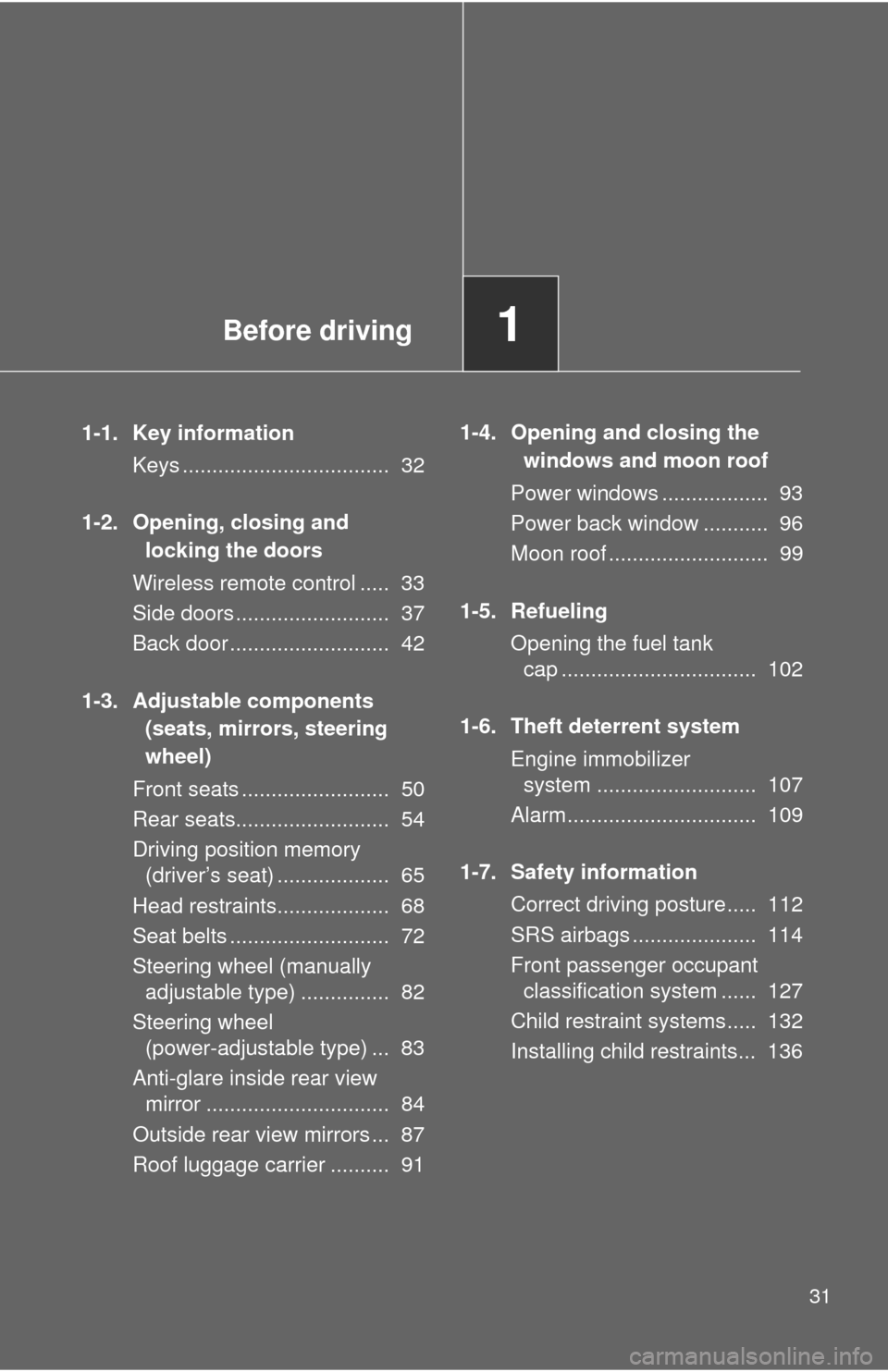
Before driving1
31
1-1. Key informationKeys ................................... 32
1-2. Opening, closing and locking the doors
Wireless remote control ..... 33
Side doors .......................... 37
Back door ........................... 42
1-3. Adjustable components (seats, mirrors, steering
wheel)
Front seats ......................... 50
Rear seats.......................... 54
Driving position memory (driver’s seat) ................... 65
Head restraints................... 68
Seat belts ........................... 72
Steering wheel (manually adjustable type) ............... 82
Steering wheel (power-adjustable type) ... 83
Anti-glare inside rear view mirror ............................... 84
Outside rear view mirrors ... 87
Roof luggage carrier .......... 91 1-4. Opening and closing the
windows and moon roof
Power windows .................. 93
Power back window ........... 96
Moon roof ........................... 99
1-5. Refueling Opening the fuel tank cap ................................. 102
1-6. Theft deterrent system Engine immobilizer system ........................... 107
Alarm................................ 109
1-7. Safety information Correct driving posture..... 112
SRS airbags ..................... 114
Front passenger occupant classification system ...... 127
Child restraint systems..... 132
Installing child restraints... 136
Page 32 of 740
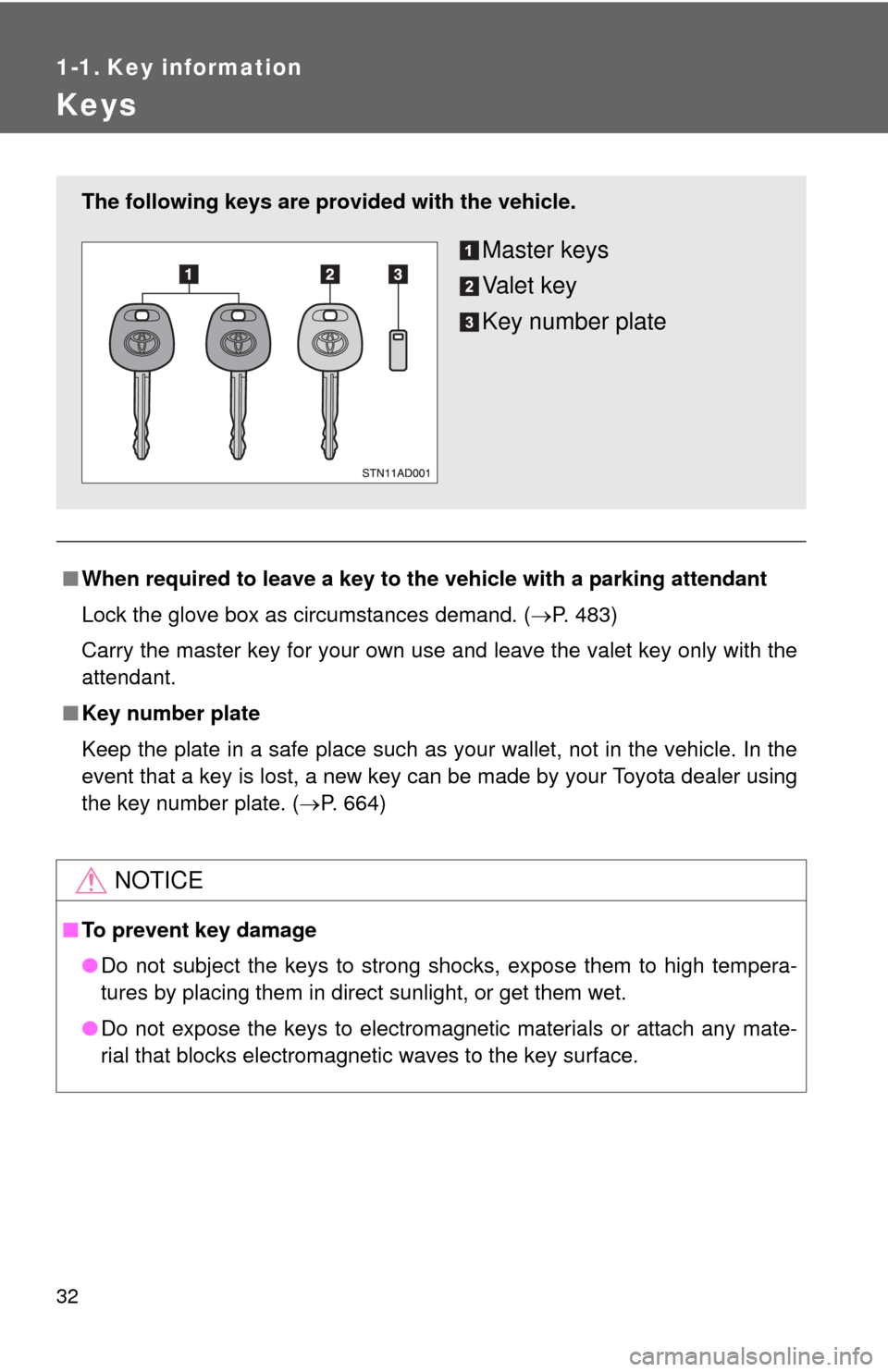
32
1-1. Key information
Keys
■When required to leave a key to the vehicle with a parking attendant
Lock the glove box as circumstances demand. ( P. 483)
Carry the master key for your own use and leave the valet key only with the
attendant.
■ Key number plate
Keep the plate in a safe place such as your wallet, not in the vehicle. In the
event that a key is lost, a new key can be made by your Toyota dealer using
the key number plate. ( P. 664)
NOTICE
■To prevent key damage
●Do not subject the keys to strong shocks, expose them to high tempera-
tures by placing them in direct sunlight, or get them wet.
● Do not expose the keys to electromagnetic materials or attach any mate-
rial that blocks electromagnetic waves to the key surface.
The following keys are provid ed with the vehicle.
Master keys
Va l e t k e y
Key number plate
Page 34 of 740
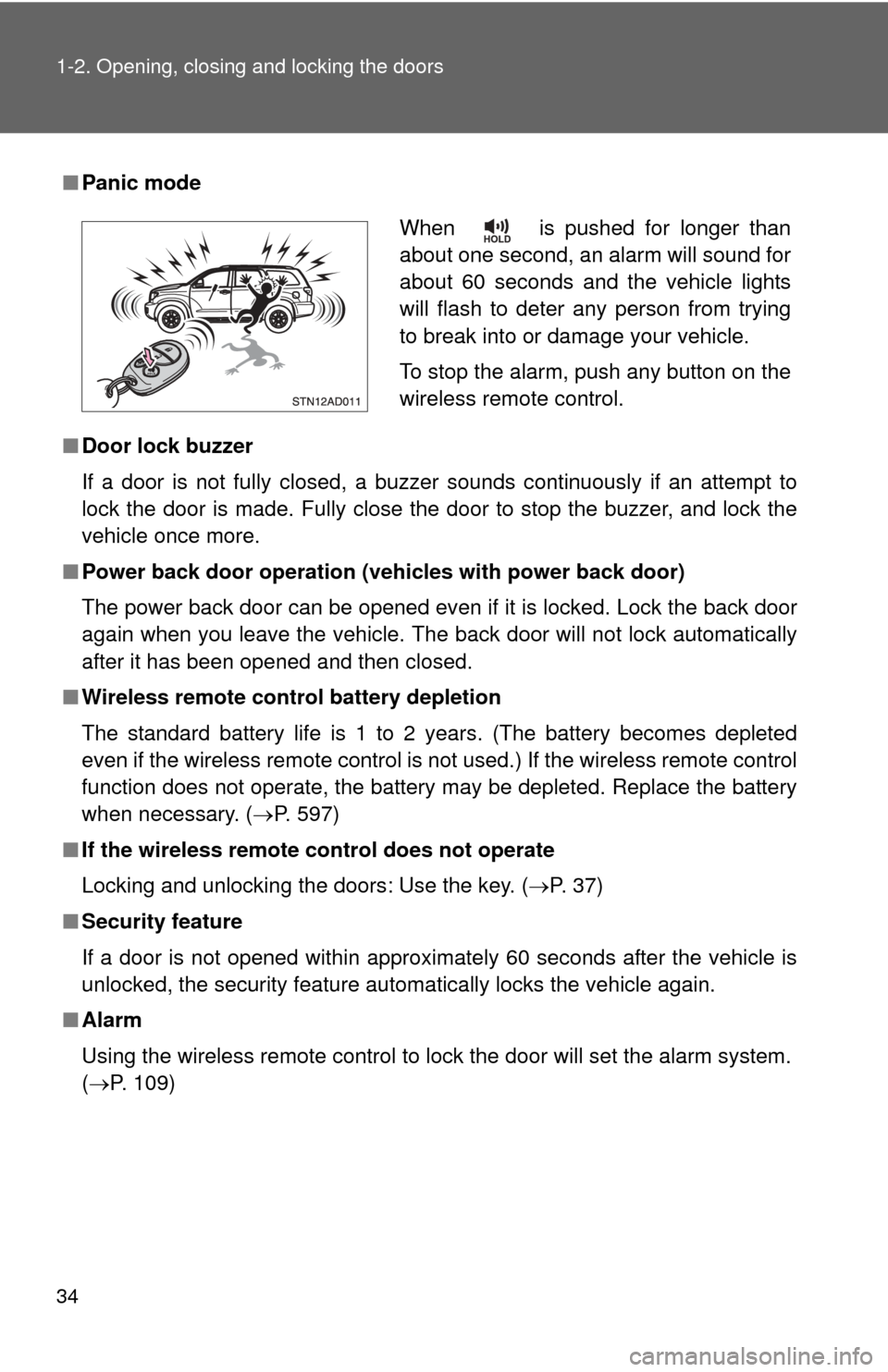
34 1-2. Opening, closing and locking the doors
■Panic mode
■ Door lock buzzer
If a door is not fully closed, a buzzer sounds continuously if an attempt to
lock the door is made. Fully close the door to stop the buzzer, and lock the
vehicle once more.
■ Power back door operation (veh icles with power back door)
The power back door can be opened even if it is locked. Lock the back door
again when you leave the vehicle. The back door will not lock automatically
after it has been opened and then closed.
■ Wireless remote control battery depletion
The standard battery life is 1 to 2 years. (The battery becomes depleted
even if the wireless remote control is not used.) If the wireless remot\
e control
function does not operate, the battery may be depleted. Replace the battery
when necessary. ( P. 597)
■ If the wireless remote control does not operate
Locking and unlocking the doors: Use the key. ( P. 37)
■ Security feature
If a door is not opened within approximately 60 seconds after the vehicle is
unlocked, the security feature automatically locks the vehicle again.
■ Alarm
Using the wireless remote control to lock the door will set the alarm sy\
stem.
(P. 109)
When is pushed for longer than
about one second, an alarm will sound for
about 60 seconds and the vehicle lights
will flash to deter any person from trying
to break into or damage your vehicle.
To stop the alarm, push any button on the
wireless remote control.
Page 35 of 740

35
1-2. Opening, closing and locking the doors
1
Before driving
■
Conditions affecting operation
The wireless remote control function may not operate normally in the follow-
ing situations.
●Near a TV tower, radio station, electr ic power plant, airport or other facil-
ity that generates strong radio waves
● When carrying a portable radio, cell ular phone or other wireless commu-
nication device
● When multiple wireless keys are in the vicinity
● When the wireless key has come into contact with, or is covered by a
metallic object
● When a wireless key (that emits radio waves) is being used nearby
● When the wireless key has been left near an electrical appliance such as
a personal computer
■ When riding in an aircraft
When bringing a wireless remote control onto an aircraft, make sure you do
not press any buttons on the wireless remote control while inside the aircraft
cabin. If you are carrying a wireless remote control in your bag etc, ensure
that the buttons are not likely to be pressed accidentally. Pressing a button
may cause the wireless remote control to emit radio waves that could inter-
fere with the operation of the aircraft.
■ Customization
●That can be configured at Toyota dealer (vehicles without multi-informa-
tion display)
Settings (e.g. wireless remote control) can be changed.
(Customizable features P. 703)
● It is possible to change the settings (vehicles with multi-information dis-
play) (Feature customization P. 182)
Page 37 of 740
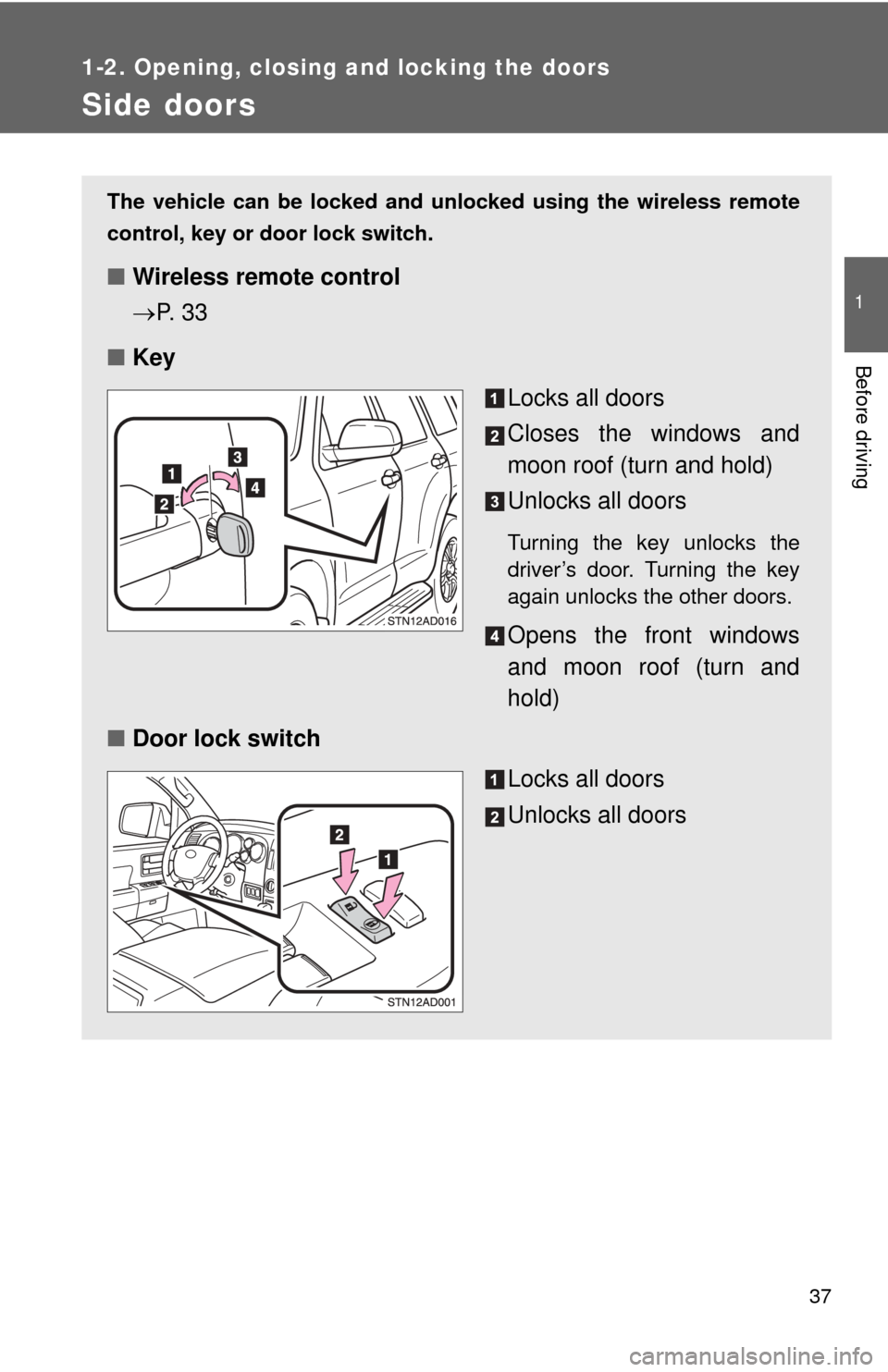
37
1
1-2. Opening, closing and locking the doors
Before driving
Side doors
The vehicle can be locked and unlocked using the wireless remote
control, key or door lock switch.
■Wireless remote control
P. 3 3
■ Key
Locks all doors
Closes the windows and
moon roof (turn and hold)
Unlocks all doors
Turning the key unlocks the
driver’s door. Turning the key
again unlocks the other doors.
Opens the front windows
and moon roof (turn and
hold)
■ Door lock switch
Locks all doors
Unlocks all doors
Page 38 of 740
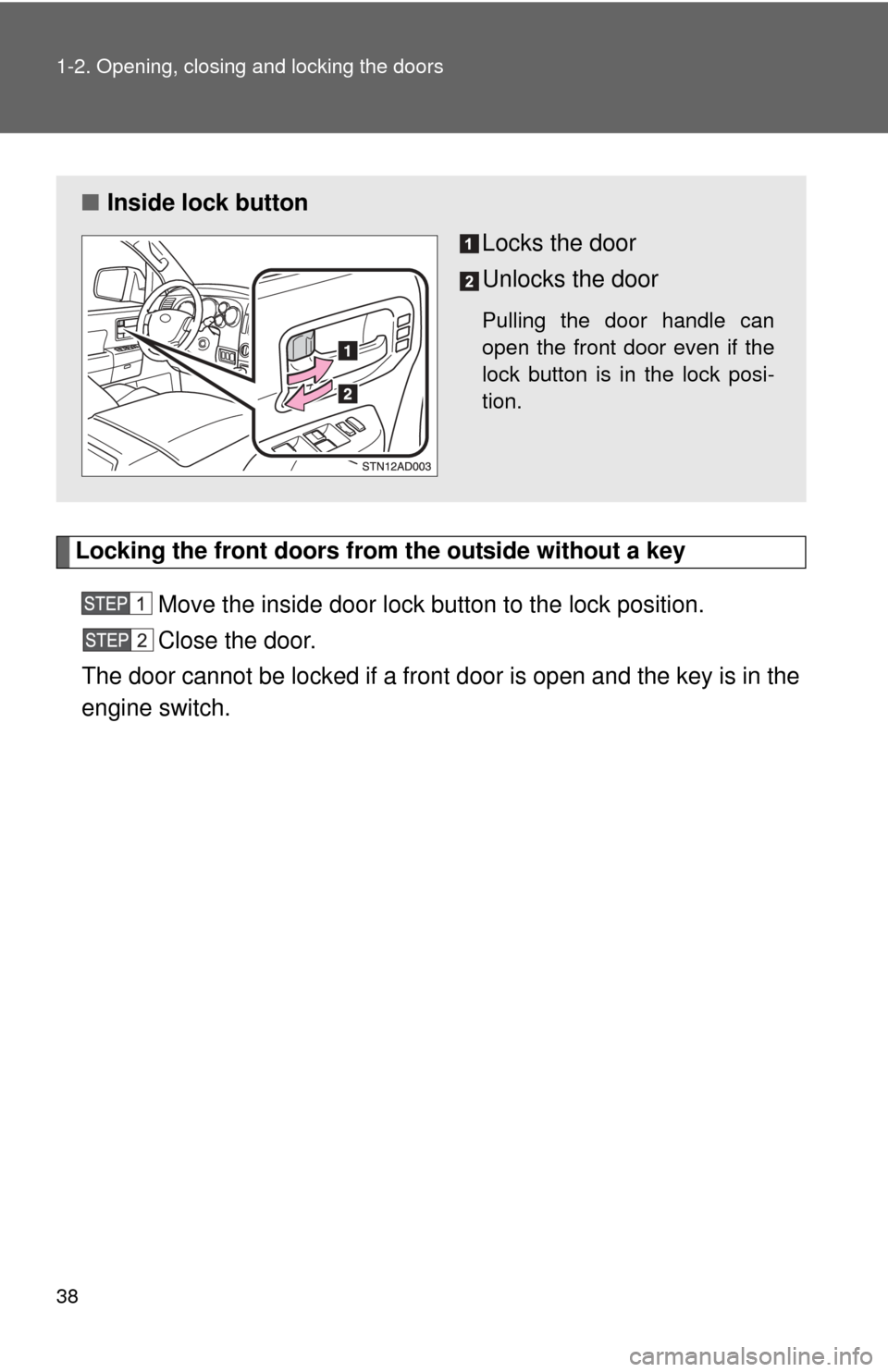
38 1-2. Opening, closing and locking the doors
Locking the front doors from the outside without a keyMove the inside door lock button to the lock position.
Close the door.
The door cannot be locked if a front door is open and the key is in the
engine switch.
■ Inside lock button
Locks the door
Unlocks the door
Pulling the door handle can
open the front door even if the
lock button is in the lock posi-
tion.
Page 41 of 740
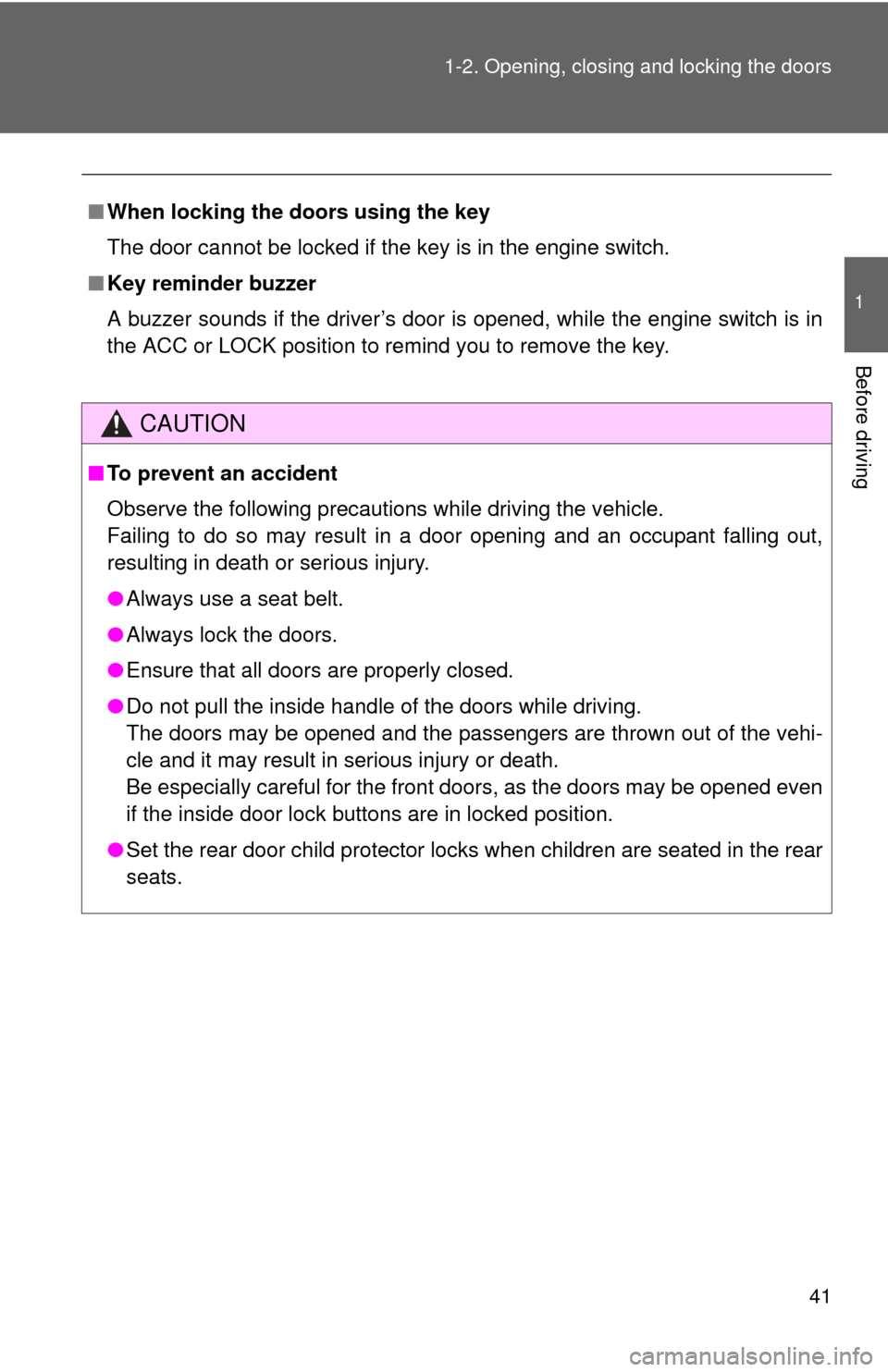
41
1-2. Opening, closing and locking the doors
1
Before driving
■
When locking the doors using the key
The door cannot be locked if the key is in the engine switch.
■ Key reminder buzzer
A buzzer sounds if the driver’s door is opened, while the engine switch is in
the ACC or LOCK position to remind you to remove the key.
CAUTION
■To prevent an accident
Observe the following precautions while driving the vehicle.
Failing to do so may result in a door opening and an occupant falling out,
resulting in death or serious injury.
●Always use a seat belt.
● Always lock the doors.
● Ensure that all doors are properly closed.
● Do not pull the inside handle of the doors while driving.
The doors may be opened and the passengers are thrown out of the vehi-
cle and it may result in serious injury or death.
Be especially careful for the front doors, as the doors may be opened even
if the inside door lock buttons are in locked position.
● Set the rear door child protector locks when children are seated in the rear
seats.